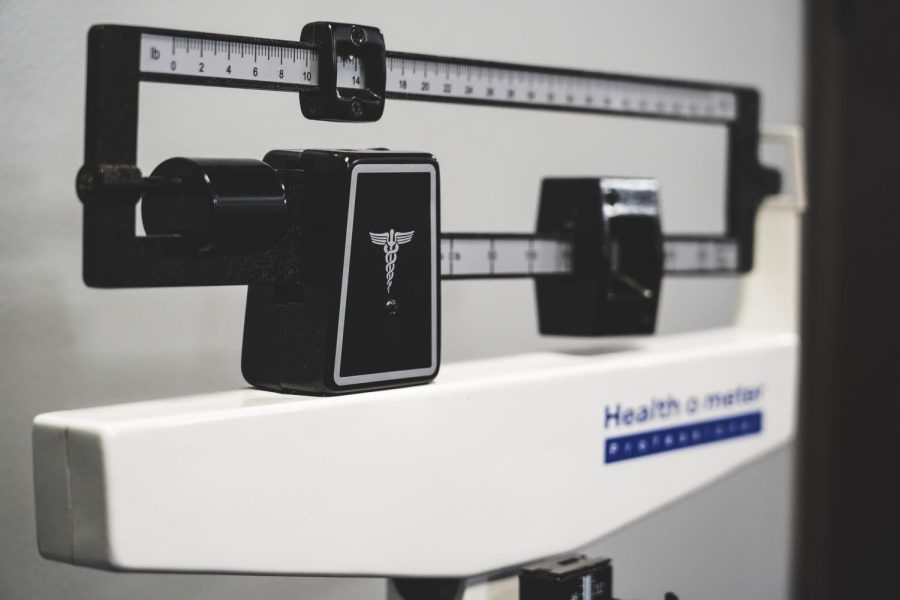Ending Diet Culture
November 2, 2020
Keto. Atkins. Celebrity endorsements and ads promising you a thin waist in 30 days. These all embody diet culture. We see it on social media on the timelines of our favorite influences and endlessly in magazine pages. Diet culture has become so toxic and very misleading that we often see it disguised as a key to wellness.
Misconceptions
A common misunderstanding when dieting is that, if I lose weight, I am healthier, and that is not the case at all.
Dr. Riggs said, “Americans are really good at knowing how to lose weight. The problem is how do we maintain that weight loss and support our health.”
Many diets consist of extreme workout regimens and restrictions. Certain diets only work for a small percentage of people, but for the larger majority, the weight is usually regained.
Dr. Riggs added that “losing the weight and then gaining it back plus more is actually harder on the body than just maintaining your current body weight.”
Another common misunderstanding is that dieting requires consuming zero fat or gluten.
“If you are not gluten sensitive then gluten should be included in your diet. You may be missing out on the necessary vitamins and nutrients,” according to the National Institute of Diabetes and Digestive and Kidney Diseases.
Stigma
Despite cliches, diet culture doesn’t just harm one body type.
“…diet culture harms people of all sizes,” according to Ragen Chastain, a National Eating Disorder Association ambassador.
Being skinny and being healthy are not synonyms like being fat does not equate to being unhealthy.
“When you see someone pathologizing fat bodies, you can explain that there are healthy and unhealthy people of every shape and size,” according to Chastain.
This way of thinking is a big reason why diet culture succeeds. Diet promoters push the narrative that losing a certain number of pounds and mirroring societies’ perception will bring happiness. Balance and moderation are important despite body size.
“I suggest that viewing thinness as an ideology instead of a quantifiable embodiment … [because it] allows for a critique of health itself, and provides a better model for understanding how diet culture operates insidiously in the lives of women and girls, and increasingly of men, regardless of their body size,” according to Jennifer Dolan, a professor at the University of South Florida.
Lifestyle Changes
Making lifestyle changes such as incorporating fruits and vegetables and physical activity in your daily routine is going to be the best thing that you can do. In addition, making smaller changes that lead to healthy habits and weight loss over time.
Riggs said, “In this country, I think we tend to think all or none. And it’s really not about that. It’s more about moderation and variety. And being physically active every day, be mindful when we’re eating.”
Riggs also adds a healthy lifestyle is 80% clean eating while the remaining 20% can be filled with foods that may not necessarily be healthy.
What does this “lifestyle change” look like?
“Drink more water, move more, eat more fruits and vegetables, watch portion sizes,” said Riggs.
Committing to making those lifestyle changes is intensive but very much achievable. They don’t even have to be big! Bringing water along with you to classes and setting intake goals for yourself is great. Also packing healthier snacks such as granola or even popcorn. Pre Packed snacks keep you from vending machine temptation.
It is also important to eat breakfast daily. This can be something light such as yogurt and fruit or a little heavier like wheat toast and avocado. But skipping breakfast is never a good option.
Lastly, stay active. As college students, we are often stuck in routines that limit our mobility, such as lengthy class periods and long hour study sessions in the library. It is important to make sure you’re getting the recommended steps. Parking further away also helps. That way you are actively moving throughout the day.
As college students, it’s important to create these healthy habits now. Eat breakfast, even if it’s something small, pack healthier snacks opting for less vending machine junk and walk (or bike) whenever you can.




